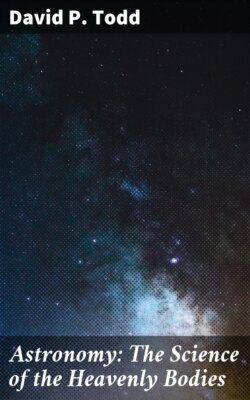Читать книгу Astronomy: The Science of the Heavenly Bodies - David P. Todd - Страница 6
На сайте Литреса книга снята с продажи.
ОглавлениеWhat glory's like to thee?
Soul of this world, this universe's eye,
No wonder some made thee deity.
To the Babylonians belongs the credit of the oldest known work on astronomy. It was written nearly six thousand years ago, about B. C. 3800, by their monarch Sargon the First, King of Agade. Only the merest fragments of this historic treatise have survived, and they indicate the reverence of the Babylonians for the sun. Another work by Sargon is entitled "Omens," which shows the intimate relationship of astronomy to mysticism and superstitious worship at this early date, and which persists even at the present day.
As remotely as B. C. 3000, the sun-god Shamash and his wife Aya are carved upon the historic cylinders of hematite and lapis lazuli, and one of the oldest designs on these cylinders represents the sun-god coming out of the Door of Sunrise, while a porter is opening the Gate of the East. The Semitic religion had as its basis a reverence for the bodies of the sky; and Samson, Hebrew for sun, was probably the sun-god of the Hebrews. The Phœnician deity, Baal, was a sun-god under differing designations; and at the epoch of the Shepherd Kings, about B. C. 1500, during the Hyksos dynasty, the sun-god was represented by a circle or disk with extended rays ending in hands, possibly the precursor of the frequently recurring Egyptian design of the winged disk or winged solar globe. Hittites, Persians, and Assyrians, as well as the Phœnicians, frequently represented the sun-god in similar fashion in their sacred glyphs or carvings.
For a long period in early human history, astronomy and astrology were pretty much the same. We can trace the history of astrology back as far as B. C. 3000 in ancient Babylonia. The motions of the sun, moon, and the five lucid planets of that time indicated the activity of the various gods who influenced human affairs. So the Babylonian priests devised an elaborate system of interpreting the phenomena of the heavens; and attaching the proper significance in human terms to everything that took place in the sky. In Babylonia and Assyria it was the king and his people for whom the prognostications were made out. It was the same in Egypt. Later, about the fifth century B. C., astrology spread through Greece, where astrologers developed the idea of the influence of planets upon individual concerns. Astrology persisted through the Dark Ages, and the great astronomers Copernicus, Tycho, Kepler, Gassendi, and Huygens were all astrologers as well. Milton makes many references to planetary influence, our language has many words with a direct origin in astrology, and in our great cities to-day are many astrologers who prepare individual horoscopes of more than ordinary interest.
It is difficult to assign the antiquity of the Chinese astronomy with any approach to definiteness. Their earliest records appear to have been total eclipses of the sun, going back nearly 2,200 years before the Christian era; and nearly a thousand years earlier the Hindu astronomy sets down a conjunction of all the planets, concerning which, however, there is doubt whether it was actually observed or merely calculated backward. Owing to a colossal misfortune, the burning of all native scientific books by order of the Emperor Tsin-Chi-Hwang-Ti, in B. C. 221, excepting only the volumes relating to agriculture, medicine, and astrology, the Chinese lost a precious mass of astronomical learning, accumulated through the ages. No less an authority than Wells Williams credits them with observing 600 solar eclipses between B. C. 2159 and A. D. 1223, and there must have been some centuries of eclipses observed and recorded anterior to B. C. 2159, as this is the date assigned to the eclipse which came unheralded by the astronomers royal, Hi and Ho, who had become intoxicated and forgot to warn the Court, in accord with their duty. China was thereby exposed to the anger of the gods, and Hi and Ho were executed by his Majesty's command. It is doubtful if there is an earlier record of any celestial phenomenon.
